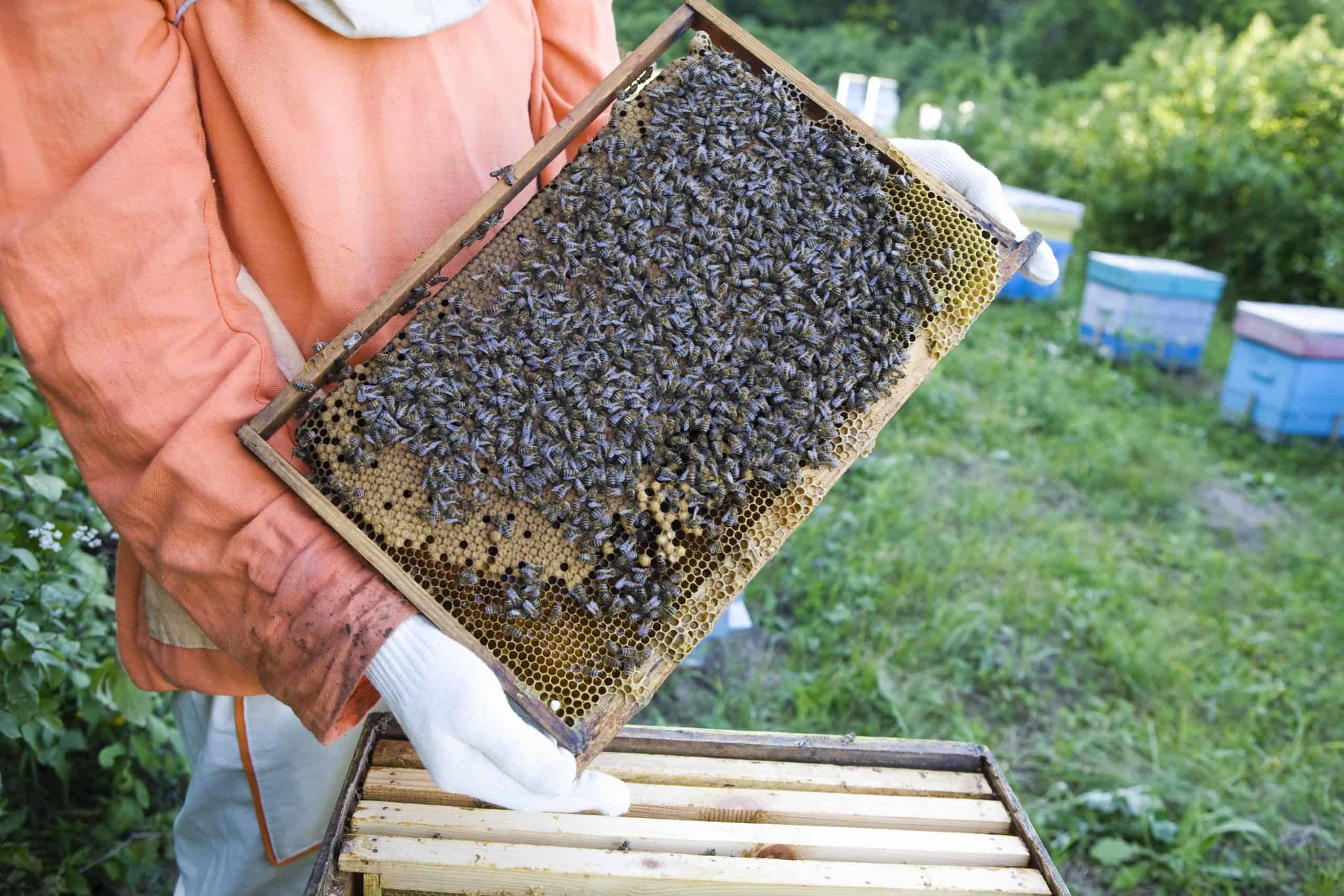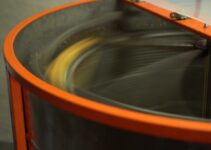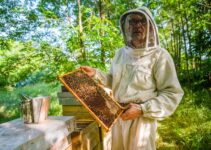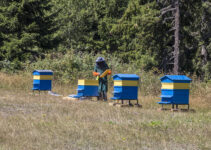Many aspiring beekeepers find it difficult to get into beekeeping because of the capital outlay to run a beekeeping business. Hobby beekeepers can make do with a hive or six, but if you want to start a commercial beekeeping venture, you will need many more hives than this. The cost to get a bee business going can be prohibitive unless you get some financial help. Are grants a possible source of revenue to get a beekeeping business started?
Grants specific to beekeeping are not available as startup funding. There are some grants in the USDA’s conservation and rural development sectors where funding can be accessed as a beekeeper. There are strict guidelines and requirements, and it is not available in all states.
Governments provide grants to start businesses that are of economic importance to the country and provide jobs in certain core sectors to boost local expertise and skills in the relevant field. We all know the importance of honeybees to the survival of mankind, but do governments view beekeeping in the same light? Are there any other means of accessing a grant to keep bees?
Will The Government Pay You To Raise Honey Bees?
Beekeeping is not a cheap undertaking, and the problem with the industry is that most of the expense to get started is upfront costs. Many beekeepers who are now commercial beekeepers started out as hobby beekeepers and built their business up year by year until it was profitable enough and they had enough bees and equipment to become their full-time income.
This process can take many years of hard part-time beekeeping while performing another job to bring in enough money to fund the beekeeping venture.
How Much Does It Cost To Start Keeping Bees?
You need to purchase protective gear, tools, hives, and bees and then possibly wait an entire season before you see any return on your investment.
Where I come from, you are considered a hobby beekeeper if you have less than 100 beehives. You only reach commercial status once your apiary gets beyond this point and your production starts to be profitable.
Your startup costs to buy 100 beehives and fill them with package bees would run in the region of $300 per hive for a hive stocked with bees as an estimate.
If you start with 100 hives, your startup cost is $30 000 before you have even bought your tools and protective gear, honey extraction, and bottling equipment which could cost in the region of $2000 to $3000. We can round this up to a total startup cost of approximately $35 000 for 100 beehives.
These hives are stocked with new bees, which will take time to strengthen and reach full production capacity. You would typically only get full production from a new hive in its second season.
This translates to carrying the startup costs for at least two years before you will start to see a significant return from your capital outlay.
These startup expenses are why new beekeepers seek out grant assistance to get a beekeeping business started.
Does The Government Offer Beekeeping Grants?
Generally, most grants would not be available for hobby beekeepers because they do not contribute significantly to the economy. To qualify for most government grants, you would need to show a significant contribution to a community, such as job creation, or a substantial contribution to the country’s economy for an activity to warrant grant funding.
Currently, the US government does not offer any federal grants specifically to prospective beekeepers. This may be surprising to many people, given the global attention that the honeybee’s plight has gained in recent years!
One may also argue that the crucial role of the honeybee in the greater scheme of food production would prompt the government to offer incentives to people interested in keeping bees and promoting their conservation and proliferation.
Unfortunately, this is not currently the situation, and no grants dedicated to the beekeeping industry or pollination industry exist. This may change in the future as wheels of government policy are slow to turn, and this industry may get some government exposure in the future.
There are federal grants offered by the US government that is administered by the US department of agriculture or USDA that are intended for the agriculture sector, but they do not cater specifically for beekeepers.
This means that you would need to get creative in your grant application if you are a beekeeper and apply for a grant under the agriculture banner and state how your beekeeping meets the criteria for the grant.
Why Does The Government Not Offer Beekeeping Grants?
The government does not dispute that we need these important pollinators and that we need to actively promote their conservation and boost their populations.
Unfortunately, government funds are limited, and the funds available for grants must be allocated to other projects that address a more immediate need.
Currently, commercial beekeepers have a role in boosting bee populations, bee conservation, and addressing pollination needs for food crops. Consequently, the need is not urgent enough to warrant direct federal intervention in offering startup grants specifically for beekeeping.
Government Offers Help On A Limited Scale
There are some cases where the government does offer funding, and some of this money can be directed towards establishing new beekeepers, but this is not the main intent for this funding.
The government will sometimes fund research projects in the agricultural or scientific sector where bees, pollination, and beekeeping may be part of the research to collect data.
In these cases, some funding for the research is channeled into establishing bee colonies for research purposes. Established beekeepers are sometimes used for these studies, but new beekeepers are sometimes encouraged to participate in the research. After the study is complete, the beekeepers get to keep the bee colonies.
Sometimes the funding for these projects will fund hives and package bees, but the beekeeper must provide their own protective clothing and tools.
What Assistance Does The Government Provide For Beekeepers?
The government does not necessarily offer startup grants to beekeepers, but they do offer disaster relief or emergency assistance to existing beekeepers should they suffer the loss of colonies as a result of natural disasters such as fires or if their bees suffer and cannot produce as a result of drought.
These federal funds are administered by the US Department of Agriculture, where you can apply for emergency assistance and disaster assistance as a result of these circumstances.
While the federal government may not have official grants directed at beekeeping, some states have their own programs to encourage people to begin beekeeping.
The Virginia Department of Agriculture has an annual program to supply 3 beehives for each household that agrees to participate in the program. The applicant’s names go into a pool, and once a year, a random draw selects some individuals to receive the hives.
The state only provides the beehives and bees; the homeowner must purchase their own personal protective gear and beekeeping tools to maintain bees and the hives.
Other states that provide funding for beekeepers include South and North Carolina, Illinois, Colorado, Massachusetts, and West Virginia. In these states, you generally need to undergo prescribed training before you can apply for the grant. There is no guarantee on application that you will be successful, but if you are, the funding can be used as startup capital for new beekeepers.
Other states such as Tennessee, Nebraska, Pennsylvania, and New York will only offer funding to promote bee conservation and awareness education and occasionally small amounts for basic startup beekeeping equipment.
What Are The Best Grants For Beekeeping?
As we have mentioned, there are no grants specific to beekeeping, but that does not mean you cannot apply for grants in the agricultural sector for farming in general, even if your farming happens to be with bees.
Generally, agriculture grants are not intended as a business startup funding program but to assist existing operations and help the farmers improve their operation to increase productivity or boost local job creation or provide a higher quality product.
The US Department of Agriculture has a Rural Business Enterprise Grant Program, intended to provide assistance to struggling rural communities and assist the agriculture sector in these regions to provide an injection of funds to boost the local agriculture sector.
This program is more about rural development rather than beekeeping, but if you can show how beekeeping can benefit the community in the local area and the bees you keep add value to increasing agricultural yields in the region, you may have a shot at sourcing funding from this grant.
The funding from the rural development program will evaluate applications and payout between $10 000 and $500 000. The criteria are that you must be a local business employing less than 50 people, have annual income revenue of less than $1 million dollars, and your nearest town must have less than 50 000 residents.
Of course, these criteria are very specific, and if you do not meet the criteria and are not in a rural area, you will not qualify for the funding.
The USDA also offers funding for innovation in conservation from the Conservation Innovation Grant fund. To achieve funding from this grant, you would need to show that your beekeeping is innovative from the perspective of bee conservation.
The focus of your application would need to be the conservation of bees rather than a commercial venture, but if you have a bee conservation idea that you believe has merit, you could apply for funding from this route.
Another USDA grant program called the Conservation Reserve Program Pollinator Initiative may be a source of funding, but there are very specific requirements.
This is another grant geared around conservation, but not only directed towards bees but all pollinators. Fortunately, bees fall into the pollinator group, which is helpful when applying for this type of grant.
The grant has $8 million available to be allocated to conserve bees and their habitats and actively working to promote the increasing populations of pollinators.
The catch to this grant is that you already need to have a property, and your land will need to be inspected to see whether it can be included in the Conservation Reserve Program. The grant also requires a commitment and a program to strengthen honey bee colonies by improving habitats for bees and planting vegetation that will provide more nutritious food sources for bees and other pollinators.
This grant is also administered by the FSA branch of the US department of agriculture, and you can find out more about this offering from any of their local branch offices. The FSA office will arrange an inspection of your land and guide you through the application process for the grant, including what you need to do to qualify and the strategy you need to implement to comply with the grant requirements.
Federal Loans For Agriculture
Another option aside from a grant is to apply for a loan from the USDA. The USDA has a branch called the Farm Service Agency or FSA, which operates countrywide to provide assistance in the agriculture sector.
The FSA has a Beginning Farmers And Ranchers Program, which guarantees credit to aspiring farmers to promote interest in the farming sector.
This is a loan intended to assist people in purchasing land and begin operating in the agriculture sector. Applications for loans for all types of farming and agriculture, including beekeeping, will be considered. There are various options available for this funding which can be researched on the Farm Loan Discovery page of the FSA website.
The FSA also has local offices in most small town and rural farming communities where you can visit in person to discuss the options with a local FSA representative.
How Do I Apply For Beekeeping Grants?
There are limited resources available for accessing any funding from the USDA or from state-specific funding programs.
The USDA has several websites that you can access to browse all their available grants and loans provided by the FSA.
Another good alternative is to speak to an FSA representative directly at one of their local offices in your region. The FSA representative will give you the best information about federal and even state programs that could be of benefit to you as a beekeeper.
Conclusion
Beekeeping is an expensive undertaking due to the high cost to start keeping bees. Because you are dealing with nature, there is also a significant delay between starting beekeeping and seeing a return on your investment.
Unfortunately, no dedicated beekeeping grants are offered by the USDA, but there are some agricultural and conservation grants that you may be able to access.
In my opinion, the best way to start beekeeping is to start as a hobby and slowly build up your operation to the point where it can provide you a full-time income. With some hard work, dedication, and commitment, you can achieve this within 5-years of starting your hobby.
References
https://www.uaex.edu/farm-ranch/special-programs/beekeeping/uabeeblog/beekeepinggrants.aspx
https://smallbusiness.chron.com/assistance-single-mothers-wanting-start-business-22407.html
https://www.thebeecause.org/the-bee-grant/
https://www.profitableventure.com/get-grants-raising-honey-bees/
https://bizfluent.com/info-12135572-grants-raising-honey-bees.html
https://www.fsa.usda.gov/programs-and-services/disaster-assistance-program/index




